Monthly Updates on Recent Books in the History of Christianity
To raise awareness of recent books in the history of Christianity, the editorial staff of Church History: Studies in Christianity and Culture highlights each month a list of 10-15 books in diverse periods and geographical regions that we hope will be of interest to our members. We include here below the 39th monthly list, chosen by our staff, with excerpts from the publishers’ blurbs.
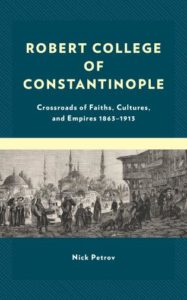
Nick Petrov, Robert College of Constantinople: Crossroads of Faiths, Cultures, and Empires 1863–1913. 2023
In 1863, Protestant missionaries established Robert College in Constantinople, the capital of the Ottoman Empire, holding the distinction of being the pioneer American college abroad. In many cases, the American educators at Robert College understood the field of education as a superior tool for mission. The book brings into conversation the convergence of the Protestant mission movement in the Ottoman Empire with the diverse tones of American efforts for providing education and assisting of the economic and social progress. The author argues that despite being established as a religious institution with common goals and aspirations, Robert College did not fully progress and reach its ambitions until the school switched to what the founding fathers called a non-religious curriculum. Robert College exclusively abandoned its Christian theological curriculum by minimizing its explicitly Christian dimensions and became a school with greater financial and structural autonomy, which eventually gave the school the freedom to become crossroads of cultures, faiths and nationalities. The story of Robert College in Constantinople is a fascinating account for examining the influence of United States foreign affairs and culture on various aspects of society in the nineteenth- and early twentieth-century Ottoman Empire.
![The Gospel of Church: How Mainline Protestants Vilified Christian Socialism and Fractured the Labor Movement [Book]](https://m.media-amazon.com/images/I/513f5P3kw4L._AC_UF1000,1000_QL80_.jpg)
Janine Giordano Drake, The Gospel of Church: How Mainline Protestants Vilified Christian Socialism and Fractured the Labor Movement. 2023
The Social Gospel movement is often seen as an altruistic effort of ministers to alleviate poverty among industrial workers in the late nineteenth and early twentieth centuries. Yet there were also other reasons church leaders were drawn to labor conflict. Socialists, particularly Christian Socialists, rivaled denominational churches for moral and spiritual leadership over the working classes. This book argues that white Protestant ministers’ mission to assert their own authority over industrial affairs undermined the public authority of the labor movement. By 1920, white Protestant members of the clergy used their national public authority, born of the Great War and their relationships with conservative labor leaders, to claim that they knew better than most rank and file workers about how to effect justice for the working classes. Protestant clergy’s mission to render the nation more Christian through the multiplicity of church plants directly undermined the labor movement’s mission to render the nation more Christian through significant changes to the social and economic system.
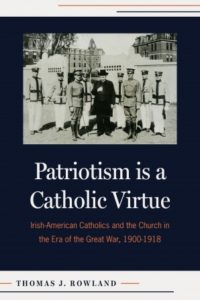
Thomas J. Rowland, Patriotism is a Catholic Virtue: Irish-American Catholics and the Church in the Era of the Great War, 1900-1918. 2023
Catholic University of America Press
Most of the literature concerning the momentous challenges facing Irish American Catholics in the first two decades of the twentieth century pay but scant attention to the role played in addressing them by the American Church. Among the myriad political, social, cultural and economic issues confronting Irish American Catholics none stand out as prominently as the unabated burden of combatting scurrilous attacks upon them by nativist forces, the task of proving themselves as loyal American citizens, and navigating the perilous waves in advancing the course of directing Irish American nationalism and the cause of Ireland’s freedom.
Patriotism is a Catholic Virtue ferrets out the impact the institutional Church played in affecting the course of action Irish American Catholics took regarding these three crucial missions. Whereas the task of confronting the assaults of nativism, seemingly the natural task for the institutional Church, this study provides extensive evidence of the relentless defense of Catholic virtue conducted by diocesan newspapers. Similarly, the mission of promoting Catholics as loyal American citizens was largely left in the hands of the American hierarchy, its clergy, newspapers and Catholic societies and affiliates. Lastly, this book provides evidence that the Church may well have played the decisive role in guiding its Irish American faithful along paths that, while conservatively promoting Irish nationalism, did not jeopardize an "American First" policy for Catholics. All of this was accomplished in the crucible of an emerging worldwide war.
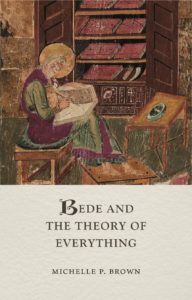
Michelle P. Brown, Bede and the Theory of Everything. 2023
This book investigates the life and world of Bede (c. 673–735), foremost scholar of the early Middle Ages and ‘the father of English history’. It examines his notable feats, including calculating the first tide-tables; playing a role in the creation of the Ceolfrith Bibles and the Lindisfarne Gospels; writing the earliest extant Old English poetry and the earliest translation of part of the Bible into English; and composing his famous Ecclesiastical History of the English People, with its single dating system. Despite never leaving Northumbria, Bede also wrote a guide to the Holy Land. Michelle P. Brown, an authority on the period, describes new discoveries regarding Bede’s handwriting, his research programme and his previously lost Old English translation of St John’s Gospel, dictated on his deathbed.
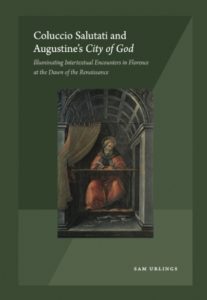
Sam Urlings, Coluccio Salutati and Augustine’s City of God: Illuminating Intertextual Encounters in Florence at the Dawn of the Renaissance. 2023
In late-Trecento Florence, the cradle of the Italian Renaissance, humanist and chancellor Coluccio Salutati found himself face to face with the “holy spirit” that was, to him, the influence of Augustine’s towering City of God – the Church Father’s masterly synthesis of late antique secular and religious thinking.
Through an analysis of contextual elements and a close reading of Salutati’s major literary works, Sam Urlings brings to light the unexplored yet profoundly significant intertextual encounter that shaped Florentine thinking on the culpability of Lucretia, the active and contemplative life, divine foreknowledge, the nature of government, and the theological power of poetry. In doing so, Coluccio Salutati and Augustine’s City of God challenges previously held assumptions regarding Renaissance “Augustinianism” on the one hand, and the chancellor’s civically-engaged thinking on the other, proposing a new, synthetic vision that allows for Salutati to illuminate and defend his faith while engaging intensely with the pressing political issues of his time.
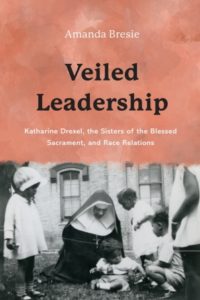
Amanda Bresie, Veiled Leadership: Katharine Drexel, the Sisters of the Blessed Sacrament, and Race Relations. 2023
Catholic University of America Press
On the rainy morning of October 1, 2000, Pope John Paul II canonized Mother Katharine Drexel. Born into a wealthy Philadelphia family, Drexel bucked society and formed the Sisters of the Blessed Sacrament for Indians and Colored People. Her compelling personal story has excited many biographers who have highlighted her holiness and catalogued her good deeds. During her life, newspapers called her the "Millionaire Nun," and much of the literature on Drexel and the Sisters of the Blessed Sacrament exalts Katharine Drexel’s disbursement of her vast fortune to benefit Black and Indigenous people. The often repeated stories of a riches to rags holy woman miss the true significance of what Mother Katharine and the Sisters of the Blessed Sacrament attempted. Drexel was not merely the ATM of Catholic Home Missions; rather, she challenged the hierarchy to reimagine its mission in the United States. In an era when the Church controlled the actions and censored the opinions of women religious, they had to listen to Mother Katharine. Most writing on Drexel and the SBS focus on Drexel’s spiritual journey, but Veiled Leadership traces the daily operations of her charitable empire and looks at how the Sisters implemented Drexel’s vision in the field. The SBS were not always welcomed in the communities they served, and they experienced conflict from both white supremacists and the people they wanted to aid.
Veiled Leadership examines the lives of Mother Katharine and her congregation within the context of larger constructs of gender, race, religion, reform, and national identity. It explores what happens when a non-dominant culture tries to impose its views and morals on other non-dominant cultures. In other words, as outliers themselves—they were semi-cloistered Catholic women from primarily immigrant backgrounds in a culture that regarded their lifestyles as alien and unnatural—their attempts to Americanize and assimilate Black and Indigenous people, whose families had been in the country for generations longer than the nuns’ own, adds complexity to our understanding of cultural hegemony.
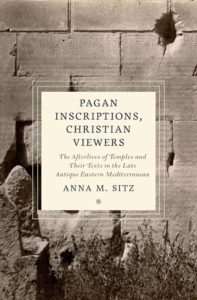
Anna M. Sitz, Pagan Inscriptions, Christian Viewers: The Afterlives of Temples and their Texts in the Late Antique Eastern Mediterranean. 2023
What did people in the early Christian period (4th–7th century CE) think about the ancient, pagan inscriptions filling their cities? Why, for example, is the famous Res Gestae of the “divine” Augustus almost perfectly preserved on the walls of a temple in Ankara in Asia Minor, even though the city became a Christian imperial center? The prima facie explanation—that late Romans ignored the older epigraphic material around them—is proven untrue in this book. By gathering both literary and archaeological evidence, this study indicates that early Christians (and late pagans, Jews) in the eastern Mediterranean interpreted older inscriptions in Greek and other languages through their own worldviews. After establishing the modes of reading ancient inscriptions in the textual sources, the book presents a series of archaeological case studies spanning from Greece to Egypt, which reveal three possible reactions to epigraphic material—preservation, spoliation, and erasure—at pagan sanctuaries, the physical and discursive spaces in which the “culture wars” of early Christian hegemony were fought. Intersecting with research on spolia, damnatio memoriae, and the fates of pagan statues, this book makes a critical intervention in the fields of epigraphy and archaeology by arguing for the transtemporal agency of inscriptions. It adds a new facet to the study of “Christianization” in the Roman world by proposing that ancient inscriptions contributed to broader attitudes about the (pagan) past in late antiquity, attitudes that continued to color how people in the medieval period and beyond evaluated classical patrimony.
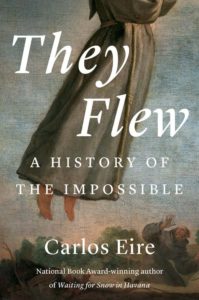
Carlos Eire, They Flew: A History of the Impossible. 2023
Accounts of seemingly impossible phenomena abounded in the early modern era—tales of levitation, bilocation, and witchcraft—even as skepticism, atheism, and empirical science were starting to supplant religious belief in the paranormal. In this book, Carlos Eire explores how a culture increasingly devoted to scientific thinking grappled with events deemed impossible by its leading intellectuals.
Eire observes how levitating saints and flying witches were as essential a component of early modern life as the religious turmoil of the age, and as much a part of history as Newton’s scientific discoveries. Relying on an array of firsthand accounts, and focusing on exceptionally impossible cases involving levitation, bilocation, witchcraft, and demonic possession, Eire challenges established assumptions about the redrawing of boundaries between the natural and supernatural that marked the transition to modernity.
Using as his case studies stories about St. Teresa of Avila, St. Joseph of Cupertino, the Venerable María de Ágreda, and three disgraced nuns, Eire challenges readers to imagine a world animated by a different understanding of reality and of the supernatural’s relationship with the natural world. The questions he explores—such as why and how “impossibility” is determined by cultural contexts, and whether there is more to reality than meets the eye or can be observed by science—have resonance and lessons for our time.
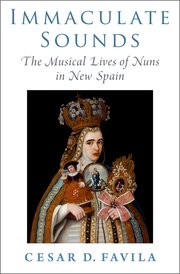
Cesar D. Favila, Immaculate Sounds:The Musical Lives of Nuns in New Spain. 2023
Accounts of seemingly impossible phenomena abounded in the early modern era—tales of levitation, bilocation, and witchcraft—even as skepticism, atheism, and empirical science were starting to supplant religious belief in the paranormal. In this book, Carlos Eire explores how a culture increasingly devoted to scientific thinking grappled with events deemed impossible by its leading intellectuals.
Eire observes how levitating saints and flying witches were as essential a component of early modern life as the religious turmoil of the age, and as much a part of history as Newton’s scientific discoveries. Relying on an array of firsthand accounts, and focusing on exceptionally impossible cases involving levitation, bilocation, witchcraft, and demonic possession, Eire challenges established assumptions about the redrawing of boundaries between the natural and supernatural that marked the transition to modernity.
Using as his case studies stories about St. Teresa of Avila, St. Joseph of Cupertino, the Venerable María de Ágreda, and three disgraced nuns, Eire challenges readers to imagine a world animated by a different understanding of reality and of the supernatural’s relationship with the natural world. The questions he explores—such as why and how “impossibility” is determined by cultural contexts, and whether there is more to reality than meets the eye or can be observed by science—have resonance and lessons for our time.
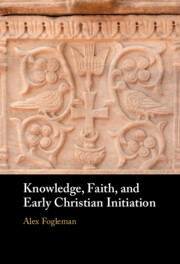
Alex Fogleman, Knowledge, Faith, and Early Christian Initiation. 2023
In this book, Alex Fogleman presents a new history of the rise and development of catechesis in Latin Patristic Christianity by focusing on the critical relationship between teaching and epistemology. Through detailed studies of key figures and catechetical texts, he offers a nuanced account of initiation in the Early Christian era to explore fundamental questions in patristic theology: What did early Christians think that it meant to know God, and how could it be taught? What theological commitments and historical circumstances undergirded the formation of the catechumenate? What difference did the Christian confession of Jesus Christ as God-made-flesh make for practices of Christian teaching? Fogleman's study provides a dynamic narrative that encompasses not only the political and social history of Christianity associated with the Constantinian shift in the fourth century but also the modes of teaching and communication that helped to establish Christian identity. This title is part of the Flip it Open Programme and may also be available Open Access. Check our website Cambridge Core for details.
Finally, for staying up-to-date on the latest titles in all fields, we recommend regularly perusing New Books Network and its "New Books in Christian Studies” page. These pages are updated regularly.
